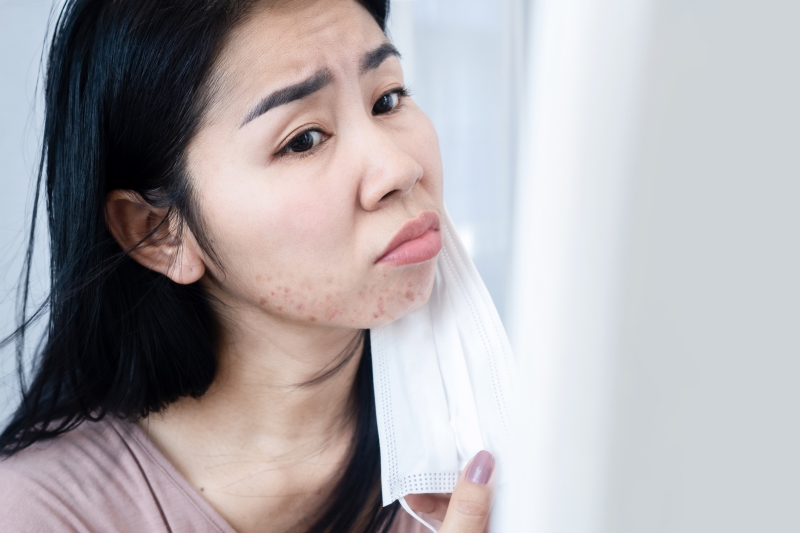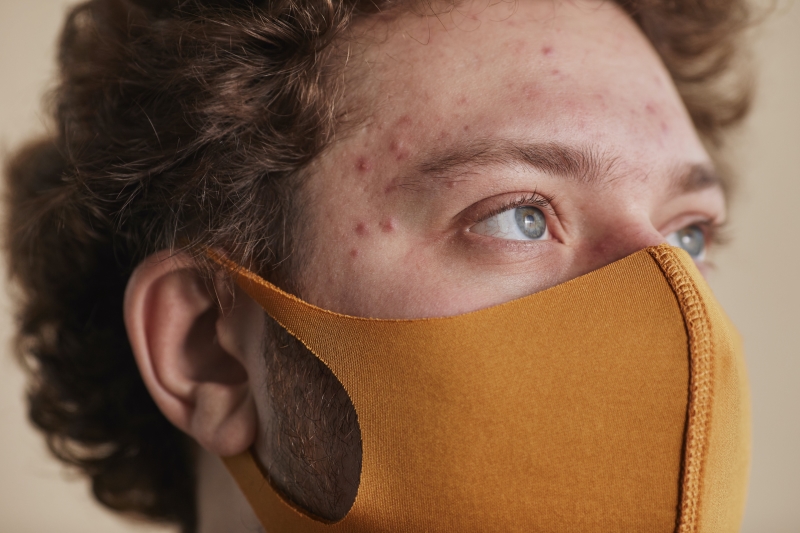In the ongoing battle against acne, the recent surge of maskne has added a new challenge to achieving clear skin. Wearing masks, while essential for public health, has led to increased skin issues by creating a warm, moist environment for bacteria to thrive.
People are now exploring various solutions, from chemical-based products to natural remedies like mānuka oil.
What is Mānuka Oil?
Mānuka oil is an essential oil derived from the leaves and branches of the mānuka tree (Leptospermum scoparium), which is native to New Zealand. The mānuka tree is the same plant that produces mānuka honey, which is renowned for its unique antibacterial properties.
Mānuka oil is extracted through steam distillation of the mānuka tree’s leaves and young branches. The oil contains various bioactive compounds, including triketones, sesquiterpenes, and other volatile organic compounds that contribute to its therapeutic properties.
What Is Acne?
Acne is a common skin condition that occurs when hair follicles become clogged with oil and dead skin cells. It often results in the formation of pimples, blackheads, or whiteheads, and it can affect various parts of the body, though it most commonly appears on the face, neck, chest, back, and shoulders.
Acne is most prevalent during adolescence due to hormonal changes, but it can affect people of all ages.
Is Mānuka Oil Good for Acne?
Mānuka oil’s antimicrobial and anti-inflammatory properties help eliminate skin issues, including acne, fungal infections, and minor wounds. It is generally applied topically on the skin’s surface to help alleviate skin irritation and support healing.
When addressing acne concerns, mānuka oil stands out as a remarkable solution for achieving clear skin without drawbacks. Unlike many chemical options that can leave the skin red, irritated, and dry, mānuka oil is a powerful yet gentle approach while providing hydration and nourishment to the skin.
- Antimicrobial Effectiveness: Acne results from various factors, including hormones and stress, but the main issue is bacteria. Pimples emerge when bacteria multiply in blocked pores, hindering the release of oil. Mānuka oil, with its natural ability to fight microbes, deters by stopping the growth of acne-causing bacteria before it becomes a problem.
- Anti-Inflammatory Benefits: In addition to its anti-bacterial properties, manuka oil is also anti-inflammatory. Acne is divided into inflammatory and non-inflammatory types, with the former causing clogged pores leading to blackheads or common pimples. Inflammation can result in red, painful acne, often seen on the face, chest, and back. The anti-inflammatory features of mānuka oil ease inflammation, enhancing the appearance and feel of the skin during the healing process.
- Wound Healing Excellence: Even in small amounts, mānuka oil is highly effective in healing wounds. Similar to the well-known properties of mānuka honey, recognised for its antioxidant and antibacterial elements, mānuka oil excels in treating wounds. Its lower pH compared to mānuka honey supports optimal wound healing. This principle applies to using mānuka oil for acne treatment—it speeds up the healing of breakouts while preventing infections.
What Is Maskne?

“Maskne” is a term coined by combining “mask” and “acne,” and it refers to the acne or skin breakouts that can occur as a result of wearing facial masks, especially for extended periods.
Face masks, particularly during the COVID-19 pandemic, have become widespread to reduce the spread of respiratory droplets and protect individuals from infection. However, the prolonged use of masks can create an environment conducive to skin issues.
What Causes Maskne?
The following factors collectively contribute to the development of maskne and associated skin issues:
1. Friction and Skin Microflora Imbalance:
- Maskne initiation is prompted by the friction generated between masks and facial skin.
- The accumulation of moisture and warmth within the mask creates an environment conducive to dysbiosis, an imbalance in the skin’s microflora.
2. Microbial Overgrowth:
- Dysbiosis, resulting from prolonged mask use, fosters the overgrowth of specific bacteria:
- Cutibacterium acnes: This bacterium is a primary culprit in the development of acne.
- Staphylococcus bacteria: Linked to a variety of skin infections.
- Corynebacterium minutissimum: Flourishes in areas with high moisture, such as skin folds and flexural regions.
3. Malassezia Fungi and Yeasts:
- Unfavorable conditions beneath the mask contribute to the proliferation of Malassezia fungi.
- Yeasts like Candida albicans thrive in this environment, adding to the complexity of skin issues.
4. Inflammatory Skin Conditions:
- The combination of prolonged mask use and dysbiosis contributes to inflammatory skin conditions.
- Conditions like eczema are particularly associated with recurrent bacterial skin infections, exacerbating overall skin health.
5. Specific Bacteria Associated with Eczema:
- Certain bacteria are commonly linked to eczema in the context of dysbiosis:
- Staphylococcus aureus: Known for its involvement in skin infections.
- Antibiotic-resistant MRSA: Presents a heightened challenge in managing skin health.
- Staphylococcus epidermidis: Another bacteria associated with eczema, contributing to the complex interplay of factors affecting the skin.
East Cape Mānuka Oil on Treating Maskne

East Cape mānuka essential oil is an excellent solution for maskne, effectively addressing various aspects of the condition. It fights bacteria and fungi linked to maskne, reduces inflammation, promotes wound healing, and soothes the skin.
The oil’s potent antimicrobial properties, driven by natural triketone compounds like flavesone, leptospermone, and iso-leptospermone, make it highly effective against a broad spectrum of microorganisms. This is supported by Minimum Inhibitory Concentrations (MICs), as summarized in the table below.
International studies highlight the anti-inflammatory and analgesic properties of sesquiterpenes found in mānuka oil, showcasing its suitability for treating inflammatory skin conditions associated with maskne (Chen et al., 2016; Kwon et al., 2013).
Notably, mānuka oil acts as a cicatrisant, aiding in wound healing and scar reduction through its antibacterial effects and its ability to stimulate human skin fibroblasts. Recent scientific studies commissioned in 2022 by Mānuka Bioscience reveal that East Cape mānuka oil surpasses reference Vitamin C in promoting collagen III production by fibroblast cells, a key factor in wound healing.
Furthermore, the oil contains high concentrations of the sesquiterpene calamenene, known for its skin-calming and analgesic properties, providing additional benefits in managing skin issues associated with maskne.
Activity of East Cape Mānuka Oil Against Microorganisms Associated With Maskne
| Organism | Type | MIC % | Maskne Relevance |
| S. aureus | B | 0.078-0.125 | Skin & wound infections, eczema |
| MRSA | B | 0.02-0.06 | Skin & wound infections, eczema |
| C. acnes | B | 0.07 | Acne |
| S. epidermidis | B | 0.05-0.078 | Acne, wound infections, eczema |
| C. minutissimum | B | 0.05 | Dark patches on the skin |
| M. furfur | F | 1.56 | Dermatitis, possibly acne |
| C. albicans | Y | 0.015 | Yeast infections |
B = Bacteria; F = Fungi; Y = Yeast
NOTE: The lower the MIC, the more effective the antimicrobial against a given pathogen.

